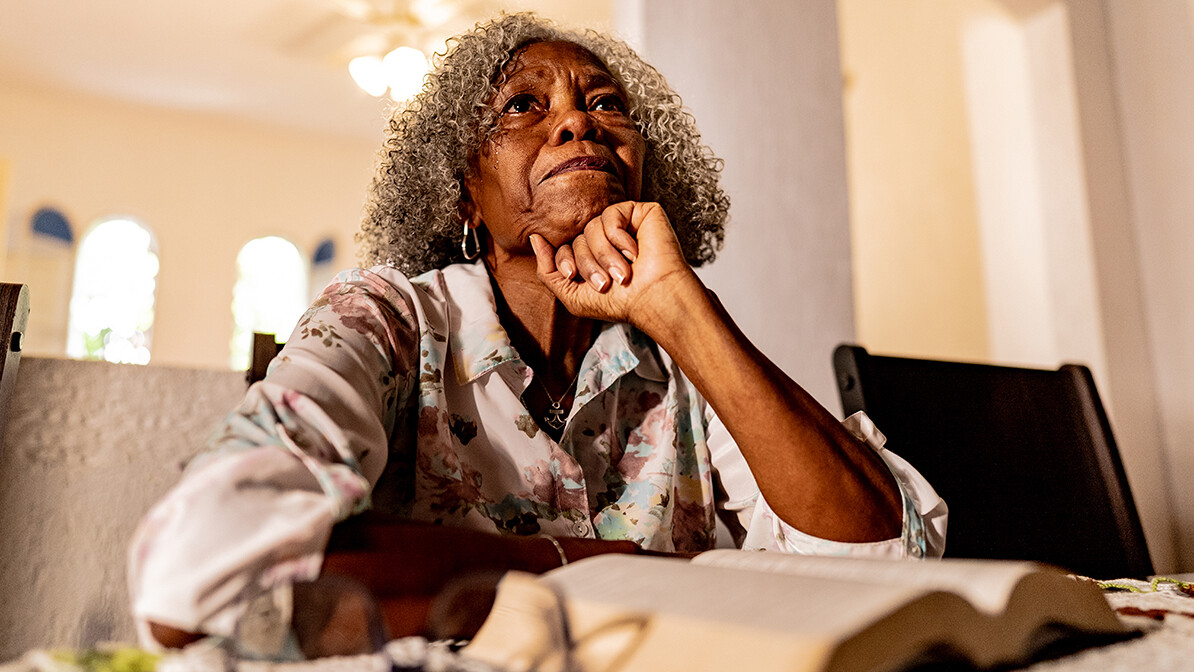- Home
- Spiritual Life
- Phylicia Masonheimer: Finding Soul-Deep Strength in a Skin-Deep World (Part 2)

Phylicia Masonheimer: Finding Soul-Deep Strength in a Skin-Deep World (Part 2)
John Farrell: What advice do you have for people who feel they should find quiet time to talk with and pray to God, but often don’t do that for whatever reason?
Phylicia Masonheimer: I think the first thing we have to do is to let go of the ideal that we’ve created. What I call the “Instagram quiet time” where you have to have the coffee, the candle, and the music, and everything needs to be perfect in order to meet God. That’s just not reality for most people and it hasn’t been reality for most of history.
If you think about “how did Paul meet God?” Well, he probably met God in prison and on the road. He was seeking God all of the time because it was a relationship. So, while it is ideal to get up early some days and be able to spend time quietly with the Lord and the Word – and I do recommend that – you have to be willing to be flexible and understand that meeting God is what matters most. Whether that’s on your lunch break, or in your car, or in the evening, and just prioritizing it no matter what.
When you let yourself go from that perfectionism, then you can really make it a priority regardless of what season you’re in.
JF: As a teacher and follower of Christ how do you discern truth from what you hear and in what you read?
Phylicia: This is a process of growing in wisdom, and the Holy Spirit really gives us that wisdom. He is who declares truth to us. But in order to declare truth to us, we have to be putting truth inside of us. Which means that the Word of God is our measure because the Holy Spirit will never contradict the Word of God. He will bring it to mind. He will use it as a measure so that we can know, “Okay, this is true and this is false. This checks out and this doesn’t.”
The more you walk with God, the deeper you go in the Word, the more consistently you’re exposed to it, the more readily you’ll be able to discern, “I don’t feel peace about this. This doesn’t seem right.” And it will be from the things you’re watching, media to friendships and conversations that you’re having and it’s not always knowing what’s bad. That’s one of the things Christians forget about discernment. It’s not just spotting what’s bad, but also knowing what’s good. Celebrating what’s good. Discernment will go both ways.
Phylicia’s Biblical Favorites
JF: In your book, Stop Calling Me Beautiful, you state that Job is not your favorite book of the Bible. What is and why?
Phylicia: I have a few, but I’d have to say, and this is going to sound funny, but I really love Leviticus. I never did when I was younger, but then I read it one year with a commentary that brought to light all of the imagery and how Jesus’ sacrifice fulfilled so much of the imagery in Leviticus. It just made the whole book come alive and made me enjoy it so much more.
JF: Is there a specific verse, whether it’s in Leviticus or some other book, that you tend to lean on in times of struggle or just when you just need to look toward the Lord?
Phylicia: Yes. This is a theme throughout the book, and it’s a verse I’ve really lived by in many difficult seasons of my life. It’s John 16:33, which says, “I have told you these things so that in me you may have peace. In this world, you will have trouble, but take heart I have overcome the world.”
I just love how beautiful this promise is because Jesus does not deny that we will have trials and difficulty. There is a trend in Christianity today that says that because God is all good, that to be in Christ means no bad can come to you and that’s literally the opposite of what Jesus taught and what Jesus experienced. So, we have this proof that Jesus says, “In this world, you will have trouble, but take heart I’ve overcome the world.” So, we have Him in the middle of our troubles.
Writing Fears and Learning Discernment
JF: What kind of worries or fears did you have while writing this book? Were there any chapters or topics you struggled with writing?
Phylicia: Yes. My biggest fear was probably handling the Word well and rightly. It’s a huge responsibility and when you’re writing a book saying that other teachers aren’t handling the Word rightly, you better handle the Word rightly. It’s a big responsibility. That was one of the things that was always on my mind.
I had a wonderful editor who really provided that accountability saying, “Where did you get this verse? Is this in context?” Making sure that what I was writing was consistent.
Chapters that were difficult? The grief chapter was very difficult. I mean, it’s about grief, but I was sharing stories of women in my life who had walked through grief and how the Lord used their stories to impact many. It was just very emotional to write that out. But I’m also just so blessed by it because I know so many other people are going to get to hear their story and God be glorified through them.
JF: I read on your website that you were a student at Liberty University. How did your time there help shape your beliefs and relationship with God?
Phylicia: Yes, I attended Liberty and I worked there for five years. I would have to say when you go to a Christian college, you can either become apathetic or you can truly learn to discern. That’s what I think I noticed – you can filter through everything you’re being taught and really learn to discern, “I’m growing in what I’m being taught here and it’s giving me a broader understanding of the world and what Christianity looks like.”
I had a choice. I had to choose. I tried to choose the latter: to be discerning. And I think what it did most was it opened my eyes to how different Christians are. The different denominations, the different ways they live out their faith, but that we unite around the gospel and around the fundamental doctrines of Christianity.
Truthfully, I think that the diversity of my own church experience and the diversity of my experience at Liberty, being around so many different denominations, is actually what equipped me for what I do today because my work reaches across so many different traditions in Christianity.
JF: What is your personal testimony?
Phylicia: I grew up in a Christian home. I was homeschooled. Wonderful parents. Discipled us diligently. I have five younger siblings, and all six of us are walking with the Lord. I truly believe that my parent’s discipleship had a lot to do with that.
But as a teenager I struggled with sexual sin in secret. That aspect of my life really made me question my faith because I didn’t understand how to reconcile my struggle with sin with being a believer. At 15, I’m asking questions like, “Can you lose your salvation? What does repentance look like?” Really deep theological questions, but I didn’t know that. All I knew was I needed an answer to this because this is my real life.
Struggling with that for all the years that I did actually laid the foundation for what I do now because I needed theology to know how to live my life. Seeking those answers eventually led to my own freedom from that lifestyle, but also led me to do the work I do now.
JF: What’s next for you?
Phylicia: I’m working on getting the book in the hands of Bible studies and small groups that want to go deeper with it and use it as an outreach tool, particularly for young women who are new to the faith. It gives such an overview of the Gospel and of the Christian mind. It’s really handy for those who are ready to start going deeper. It is helpful and I’ve heard great feedback from persons who’ve been Christians their whole lives too, but I really see it as a discipleship tool for mature Christians to use in the lives of those who are new or are coming out of shallow theology. That’s probably what I’ll be working toward in the next couple of months.
JF: Where is the best place for people to find your book?
Phylicia: My website, phyliciamasonheimer.com, is where all my articles are housed. My podcast is linked there and the book is linked there. Most people enjoy following me on Instagram where I’m @PhyliciaMasonheimer and do teaching on my Instagram stories. My Facebook is also a place to find me at the same @PhyliciaMasonheimer.
Trending Now
Sign up today for your Inspiration Today Daily Newsletter
Supercharge your faith and ignite your spirit. Find hope in God’s word. Receive your Inspiration Today newsletter now!
John Farrell
John Farrell serves as the Digital Content Manager at Inspiration Ministries, where he oversees the planning, organization, and management of website content to support the ministry's global digital outreach. With a strong background in writing and editorial strategy, John ensures that the articles, devotionals, and discipleship resources on Inspiration.org are accurate, engaging, and aligned with the ministry's mission.
John has authored more than 1,000 articles, press releases, and features for Inspiration Ministries, NASCAR, Lionel, and Speed Digital. His versatility as a writer is also showcased in his 2012 book, The Official NASCAR Trivia Book: With 1,001 Facts and Questions to Test Your Racing Knowledge.
A graduate of Appalachian State University, John brings excellence and attention to detail to the digital experience at Inspiration Ministries. He lives in Concord, N.C., with his wife and two sons.
Related Articles
February 18, 2026
Ash Wednesday: Ashes to Ashes, Dust to Dust
Ash Wednesday invites believers to pause, remember their need for repentance, and prepare their…
February 17, 2026
You Don’t Have to Fix Everything to Be a ‘Good’ Christian
One of the most common—and exhausting—misconceptions among Christians, especially new believers, is…
February 17, 2026
How to Overcome Stress with God’s Peace
Stress has a way of disguising itself as responsibility, urgency, or even wisdom. But when fear…
February 17, 2026
Practical Steps to Overcoming Stress and Finding God’s Peace
Many people today believe that stress and anxiety are unavoidable. But Scripture tells us Jesus…
Next Steps To Strengthen Your Walk
Inspiration Today Newsletter
Supercharge your faith and ignite your spirit. Find hope in God’s word. Receive your Inspiration Today newsletter now!
Christian Articles
Find articles to strengthen your walk and grow your faith. We have a wide range of topics and authors for you.
Submit A Prayer Request
We are here for you. Simply click on the button below to reach us by form, email or phone. Together we will lift our hearts and voices with you in prayer.





